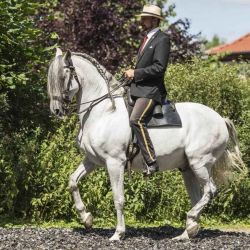Share

Clan of the Horses
10 - Not invisible, just slow - MOZ#1
Season 2, Ep. 10
•
MOZ (moments of Zen) refers to moments I have experienced with horses that have taught me something important or inspired me to make a significant shift in the way I relate to or understand my horses. This is one of those moments.
More episodes
View all episodes

35. 35 - Judgement Day in Equestrian Sports
50:41Have Grand Prix Dressage on international level been reduced to a culture dominated by silence, greed and money? A culture where good people are reluctant to speak their minds when they should be advocating for the welfare of horses? Former FEI Judge Hege Trulsen, talks about some of challenges we are facing at the moment, and how we can solve them. This is a translated and updated version of the original Norwegian interview published in December 2023. www.clanofthehorses.com.
34. 34 #LetHorsesSpeak
38:57In this episode, I revisit Sue Dyson, one of the initiators Horse and Hound referred to as top equestrians when we launched our petition campaign New Era for Equestrian Sports #LetHorsesSpeak in December 2023. Sue Dyson is a specialist in veterinary medicine and rehabilitation, a surgeon specialist in Equine orthopedics and I've come to know her as a professional who has dedicated her life to improve horse welfare.
33. 33 - An Open Letter to the FEI
16:25A horse can certainly be forced to do whatever we want it to do because they are sensitive flight animals seeking safety and survival. And if events organised by the FEI do not crack down on ugly riding on warm-up arenas, or displayed conflict behaviour in horses and fail to set a proper ethical and welfare standard for the sport, what do you think happens at events further down the food chain?
32. 32 - Meet Elaine Butler
40:07- Sometimes the horse exhibits behaviour that we mistakenly interpret as disobedience, but it's actually a cry for help. In such cases, it's not effective to ride for a trainer who instructs you to look straight ahead, keep your hands still, and use your legs, says Elaine Butler, who was forced to change her approach when she bought a horse that wouldn't yield.
31. 31 - Biomechanics meets AI
48:03- I really call this disruptive technology because from this point on there is no excuse anymore not to measure lameness objectively. It's practical, it's scientifically proven and it's validated, says doctor in veterinary medicine Filipe Bragança, who holds a PhD in biomechanics.
30. 30 - Meet James A. Serpell
39:31- We need to start with the assumption that animals aren’t looking for conflict. They don’t want conflict any more than we do. But animals will become aggressive if they become frightened. So the number one point is never to scare them, says Professor Emeritus of Ethics and Animal Welfare, James Serpell.
29. 29 - It's all about connection
42:13- Good ridning means that you stop disturbing the horse, and that is one thing I find it important to tell everybody; get out of the way, cause you are the problem, says Arne Koets, who during his five years as a rider and curator at the Fürstliche Hofreitschule in Bückeburg truly started to master the art of riding and the High School movements. He is a very versatile trainer and a full-time professional instructor in HEMA (Historical European Martial Art). Photo: Matilde Brandt
28. 28 -Meet Jeff Sanders II
42:36- Rather than focussing on the footfall of your horse, feel the rhythm in the movement of his spine. It is like the rhythm of a song, and you can move with it, says Jeff Sanders. Photo: Amanda Melchior.
27. 27 - Meet Jeff Sanders
33:00- We have a running joke in the US about how California and Texas got into a fight about horsemanship and Texas won, says trainer Jeff Sanders.